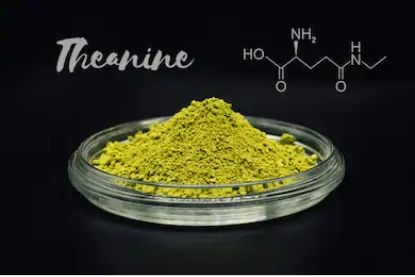Be Golden as gold mine & Green as leaf
carpe diemBe Golden as gold mine & Green as leaf
carpe diemL-Theanine
L-Theanine

L-theanine is an amino acid found most commonly in tea leaves and in small amounts in Bay Bolete mushrooms. It can be found in both green and black tea. It’s also available in pill or tablet form at many drugstores.
Research indicates that L-theanine promotes relaxation without drowsiness. Many people take L-theanine to help ease stress and unwind.
Before trying it out yourself, learn more about the potential health benefits, as well as any possible risks or complications
.
Most known for helping people relax, L-theanine has many other potential health benefits, including:
Anxiety and stress-relief
A hot cup of tea can help anyone feel more at ease, but research suggests it may be the most beneficial for those dealing with high levels of anxiety.
Five randomized-controlled trials with a total of 104 participants found L-theanine reduced stress and anxiety in people who were experiencing stressful situations.
Another study found that it increased relaxation without causing drowsiness and reduced resting heart rate.
A study published in the Journal of Clinical Psychiatry focused on people with schizophrenia or schizoaffective disorder. Researchers found that L-theanine decreased anxiety and improved symptoms

.
Increased focus
Paired with caffeine, L-theanine may help increase focus and attention.
A 2013 study found that moderate levels of L-theanine and caffeine (about 97 mg and 40 mg) helped a group of young adults to focus better during demanding tasks.
The study’s participants also felt more alert and less tired in general. According to another study, these effects can be felt in as little as 30 minutes.
Better immunity
Some research suggests that L-theanine may improve the function of the body’s immune system. One study published in the journal Beverages found that L-theanine could help decrease the incidence of upper respiratory tract infections.
Another study found that L-theanine could help improve inflammation in the intestinal tract. However, more research is needed to confirm and expand on these findings.
Tumor and cancer treatment
The authors of a 2011 study suggest that L-theanine found in the Bay Bolete mushroom works together to improve the effectiveness of certain chemotherapy drugs.
Because of these promising findings, the same biotechnology researchers expect that L-theanine could also help improve chemotherapy’s ability to fight cancer.
Although there’s no definitive evidence to show that tea prevents cancer, a number of studies suggest that people who regularly drink tea have lower rates of cancer.
Researchers of one study in China found that women diagnosed with ovarian cancer who drank at least one cup of green tea a day lived longer than those who didn’t.
Another study that looked at tea drinkers compared to nondrinkers found that those who drank tea were 37 percent less likely to develop pancreatic cancer.
Blood pressure control
L-theanine may be beneficial for those who experience increased blood pressure in stressful situations.
A 2012 study observed people who normally experienced higher blood pressure after certain mental tasks.
They found that L-theanine helped control this blood pressure increase in those groups. In the same study, the researchers noted that caffeine had a similar but less beneficial effect.
Improved sleep quality
Some research indicates that L-theanine could be beneficial for a good night’s sleep. Researchers in one study found that doses of 250 mg and 400 mg of L-theanine greatly improved sleep in animals and humans.
Also, 200 mg of L-theanine was shown to reduce resting heart rate, pointing to its ability to promote relaxation.
L-theanine may also help boys diagnosed with attention deficit hyperactivity disorder (ADHD) sleep better.
A 2011 study looked at the effects of L-theanine on 98 boys aged 8 to 12. A randomized group was given two 100 mg chewable tablets of L-theanine twice daily. The other group received placebo pills.
After six weeks, the group taking L-theanine was found to have had longer, more restful sleep. While the results are promising, more research is needed before it can be proven as safe and effective, especially for children.
Other research found that L-theanine improved sleep quality for those diagnosed with schizophrenia.
Sinusitis relief
If you’re experiencing sinusitis, a cup of tea may help you find some relief.
Murray Grossan, MD, author of The Whole Body Approach to Allergy and Sinus Health and founder of the Grossan Sinus & Health Institute, notes that L-theanine can boost cilia movement in the nose.
Cilia are the hair-like strands that help clear up mucus that can be affected by an infection.
“In sinus disease, the cilia of the nose no longer pulse to remove stale mucus from the nose and sinuses,” he says.
“Instead, the mucus becomes thick, and this provides a place for bacteria to multiply. When the tea is added, the cilia speed up, mucus thins, and healing is on its way.”
There are no confirmed or direct side effects of taking L-theanine. Generally speaking, it’s safe to take the supplement and drink teas that contain L-theanine.
But even though some research shows promising results for L-theanine’s anti-tumor properties, teas that contain amino acids can have other ingredients that could be harmful for people with cancer.
According to Memorial Sloan Kettering Cancer Center, the polyphenol EGCG found in green tea can actually reduce the efficacy of some chemotherapy drugs, such as bortezomib.
For that reason, it’s very important for those taking chemotherapy drugs to consult their doctors before drinking large amounts of green tea as part of their treatment plan.
Similar to drinking too much coffee and other caffeinated drinks, drinking large amounts of caffeinated teas can also cause problems, such as:
Women who are pregnant or breastfeeding should also limit how much tea they drink to avoid over-caffeinating. It’s best to ask your doctor about what’s safe for you. The same advice applies to children as well.
Because there’s been no conclusive research, a safe L-theanine dosage recommendation isn’t known. There have been no reports of overdose or side effects of taking L-theanine, and drinking tea is generally safe for most people.
But following general caffeine consumption guidelines can be helpful if you’re drinking tea. For those taking an L-theanine supplement, it’s best to consult your doctor for guidance on dosage



